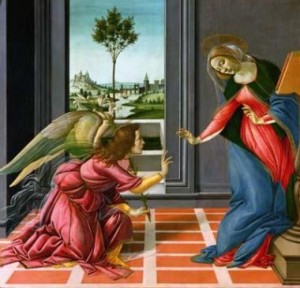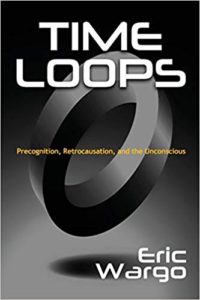The Annunciation (pt. 2)
 Alchemy was and remains the only science and art of bowing to the perception, of submitting to what can describe, in worldly terms, as “beauty,” so long as we understand that true beauty, which is formed in the eye of the beholder, is a perception of spirit in flesh, not of flesh alone. (It was never flesh alone, and anyone who thinks that it is is misguided.)
Alchemy was and remains the only science and art of bowing to the perception, of submitting to what can describe, in worldly terms, as “beauty,” so long as we understand that true beauty, which is formed in the eye of the beholder, is a perception of spirit in flesh, not of flesh alone. (It was never flesh alone, and anyone who thinks that it is is misguided.)
The Hermetic meaning of the Annunciation has to do with the same problem treated in Genesis—what you could call “the Immaculate Conception of Will.” How do you generate something from nothing? Something as simple as an action?
Spirit is the mediator, but that means nothing without understanding what is being mediated. The receptive pole, Mary, the Virgin, is the easiest to understand. Yet we should not slip so easily into the cliché that she is simply the receptive vessel. We need to understand what is meant by her purity. Like an empty, clean cup, she is fully capable of being filled by spirit. Receptivity is an abstraction as long as it is not expressed through a gesture of allowing to be filled. The ‘Mary function’ is revealed in the moment she says “Be it unto me according to thy word”—that is to say, in her gesture of willingness. The decomposition of moments in the Annunciation by the Medieval painters amounted to an analysis of this key mystery at the heart of the feminine.
Willingness must not be confused with will. Essentially, willingness is one part of will. In the analysis of will, you must confront both its male and female components.
The male component of will is a form of perception first described in Genesis I: “He saw that it was good” and repeated, by proxy, through the mouth of the Angel in Luke: “You have found favor with the Lord.” This perception that sees, and is gladdened or heartened by what it sees, is also completed, given form, by a gesture, and the Medieval painters quite aptly expressed this aspect of the larger mystery via the courtly idiom.
So, we have in this scene a chivalrous gesture expressing a perception, met in a gesture of willingness. But to understand the true quality of willingness, we must understand its viscosity, its inherent resistance. Willingness is paradoxically both avid and hesitant. You can unfold it, as it were, in time, to examine its discrete aspects: There is an initial shock or surprise, which proceeds to inquiry, then reflection, and lastly culminates in an agreement. These “moments” unfold in an instant—they are aspects of the willingness function that can only be analyzed when decomposed. The Medieval painters followed the schema of Luke’s narrative, in which Mary’s response is separated into discrete moments, but this temporal unfolding is itself a declination to our human faculties of understanding, bowing to our mind so that we, in our own sluggishness, may be pulled upward toward knowledge, toward Gnosis.
How can we not also see the temptation of Eve as wonderful, in this way? There too we have a seduction, a beguiling through promises whispered, an inquiry and reflection, and lastly a collusion, though it earned such opprobrium from the simpleminded dogmatists that Eve’s sex has always been discredited. Innocent and hesitant, but also completely receptive, the Virgin, the Mother (whether we refer to Eve, our First Mother, or to Mary, the Mother of Our Stone) shows us the Matter of divine practice: the inert earth, the substance, the first substance of Our Art.
Yet we should not get sidetracked into matters of chemistry. We were talking of will and its components. How can there arise in a universe of causes a truly original action? An Hermetic reading of Scripture gives us an answer: Will is not an exertion. It is a perception infused into an attitude, a response of the body to the divine, accepting the infusion of spirit. The act is originally empty of spirit. It arises as a natural consequence of this interpenetration of gestures; it is gestated by Nature in the womb of the Virgin. Christ, the birth, is the Act. The Act comes from God and goes back to God. Its perfection is solely a function of its exalted origins. It is Noble because it is of Noble birth. Its vicissitude is pain. Its result is the salvation of the world, the redemption of Man.



